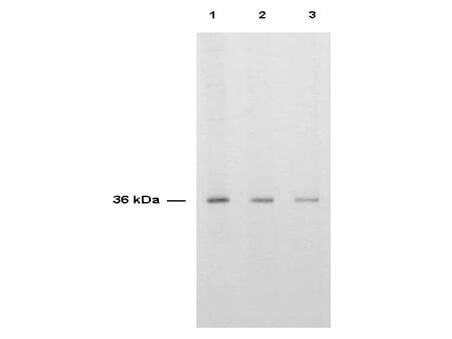Anti-THYMIDYLATE SYNTHASE (RABBIT) Antibody
Thymidylate Synthase Antibody
- SPECIFICATION
- CITATIONS
- PROTOCOLS
- BACKGROUND

| Host | Rabbit |
|---|---|
| Conjugate | Unconjugated |
| Target Species | Human |
| Reactivity | Human |
| Clonality | Polyclonal |
Application
| WB, IHC, E, I, LCI |
| Application Note | Anti-Thymidylate Synthase has been tested by western blot and is suitable for use in ELISA, immunoprecipitation, immunofluorescence microscopy, immunohistochemistry and immunoblotting. The antibody recognizes the expected additional band corresponding to the ternary complex of hTS-dFUMP-reduced folate in HeLa cells treated with the TS inhibitor 5-FUdR. This event occurs in most human breast, colorectal, gastric, head and neck carcinomas. The antibody recognizes the 36,000 MW hTS. Reactivity in other immunoassays is unknown. |
| Physical State | Liquid (sterile filtered) |
| Immunogen | This whole rabbit serum was prepared by repeated immunizations with recombinant human Thymidylate Synthase (36 kDa) produced in E.coli. |
| Preservative | 0.01% (w/v) Sodium Azide |
| Gene ID | 7298 |
|---|---|
| Other Names | 7298 |
| Purity | This antiserum is directed against human Thymidylate Synthase and is useful in determining its presence in various assays. Because inhibition of Thymidylate Synthase prevents DNA synthesis and cell proliferation, the enzyme is an important target for cancer chemotherapeutic drugs, specifically the fluoropyrimidine group of antineoplastic drugs used to treat solid tumors. In general, this antibody can detect antigen in a variety of human cells and tissues, as well as bacteria, African green monkey, rat and mouse. Somewhat lower dilutions may be required in some non-human cell lines. Anti-Thymidylate Synthase can detect Thymidylate Synthase by immunochemistry in proliferating cell cultures and tissues but does not stain nonproliferating cells. Normal colon mucosa shows weak staining; however, some colorectal cancer specimens show very strong staining. |
| Storage Condition | Store vial at -20° C prior to opening. Aliquot contents and freeze at -20° C or below for extended storage. Avoid cycles of freezing and thawing. Centrifuge product if not completely clear after standing at room temperature. This product is stable for several weeks at 4° C as an undiluted liquid. Dilute only prior to immediate use. |
| Precautions Note | This product is for research use only and is not intended for therapeutic or diagnostic applications. |
| Name | TYMS (HGNC:12441) |
|---|---|
| Synonyms | TS |
| Function | Catalyzes the reductive methylation of 2'-deoxyuridine 5'- monophosphate (dUMP) to thymidine 5'-monophosphate (dTMP), using the cosubstrate, 5,10- methylenetetrahydrofolate (CH2H4folate) as a 1- carbon donor and reductant and contributes to the de novo mitochondrial thymidylate biosynthesis pathway. |
| Cellular Location | Nucleus. Cytoplasm. Mitochondrion. Mitochondrion matrix. Mitochondrion inner membrane |

Thousands of laboratories across the world have published research that depended on the performance of antibodies from Abcepta to advance their research. Check out links to articles that cite our products in major peer-reviewed journals, organized by research category.
info@abcepta.com, and receive a free "I Love Antibodies" mug.
Provided below are standard protocols that you may find useful for product applications.
Background
Thymidylate synthase catalyzes the methylation of deoxyuridylate to deoxythymidylate using 5,10-methylenetetrahydrofolate (methylene-THF) as a cofactor. This function maintains the dTMP (thymidine-5-prime monophosphate) pool critical for DNA replication and repair. The enzyme has been of interest as a target for cancer chemotherapeutic agents. It is considered to be the primary site of action for 5-fluorouracil, 5-fluoro-2-prime-deoxyuridine, and some folate analogs. Expression of this gene and that of a naturally occurring antisense transcript rTS alpha vary inversely when cell-growth progresses from late-log to plateau phase. Diseases associated with Thymidylate synthase include Rectal Neoplasm and Dihydropyrimidine Dehydrogenase Deficiency. Anti-Thymidylate synthase is useful for researchers interested in Circadian Rhythm, Metabolism and cell cycle research.
If you have used an Abcepta product and would like to share how it has performed, please click on the "Submit Review" button and provide the requested information. Our staff will examine and post your review and contact you if needed.
If you have any additional inquiries please email technical services at tech@abcepta.com.













 Foundational characteristics of cancer include proliferation, angiogenesis, migration, evasion of apoptosis, and cellular immortality. Find key markers for these cellular processes and antibodies to detect them.
Foundational characteristics of cancer include proliferation, angiogenesis, migration, evasion of apoptosis, and cellular immortality. Find key markers for these cellular processes and antibodies to detect them. The SUMOplot™ Analysis Program predicts and scores sumoylation sites in your protein. SUMOylation is a post-translational modification involved in various cellular processes, such as nuclear-cytosolic transport, transcriptional regulation, apoptosis, protein stability, response to stress, and progression through the cell cycle.
The SUMOplot™ Analysis Program predicts and scores sumoylation sites in your protein. SUMOylation is a post-translational modification involved in various cellular processes, such as nuclear-cytosolic transport, transcriptional regulation, apoptosis, protein stability, response to stress, and progression through the cell cycle. The Autophagy Receptor Motif Plotter predicts and scores autophagy receptor binding sites in your protein. Identifying proteins connected to this pathway is critical to understanding the role of autophagy in physiological as well as pathological processes such as development, differentiation, neurodegenerative diseases, stress, infection, and cancer.
The Autophagy Receptor Motif Plotter predicts and scores autophagy receptor binding sites in your protein. Identifying proteins connected to this pathway is critical to understanding the role of autophagy in physiological as well as pathological processes such as development, differentiation, neurodegenerative diseases, stress, infection, and cancer.


